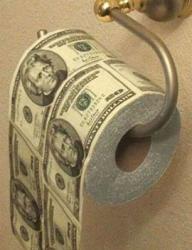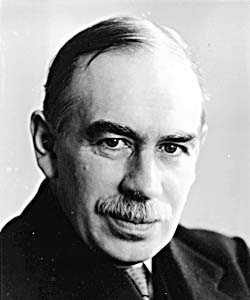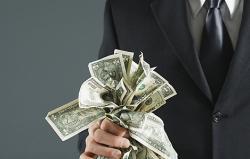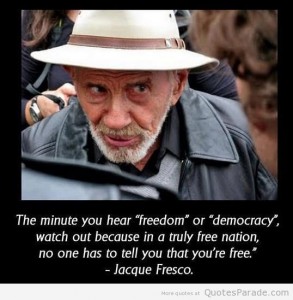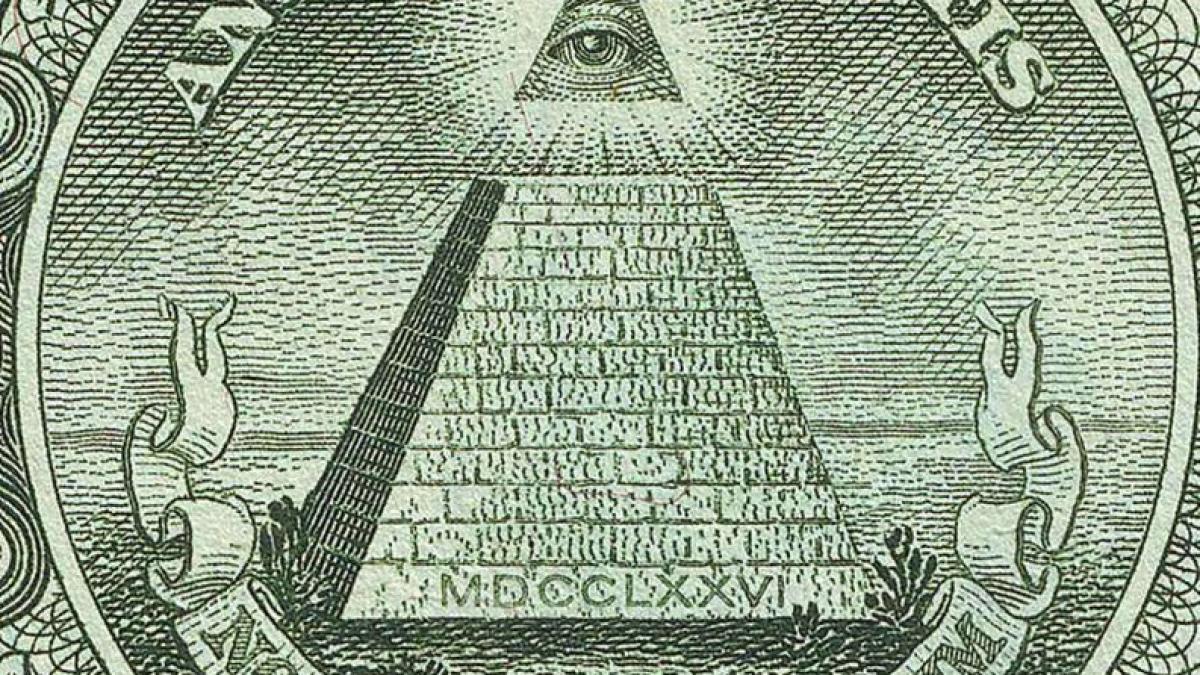Foray into an area reserved too: money - Part 5
See beginning Part 1, Part 2, Part 3, Part 4
IV
1: Large monetary theories
What is striking when one delves into the literature on the currency, the number of major theories that are dealt out there with perfect assurance even when they contradict each other. We absolutely can not pretend that this area is a science, it was rather the impression that economists vis-à-vis the currency in the position of the sorcerer's apprentice: their instrument eludes them.
For we find him, we trusted in the synthesis brought forward by Jean-Marie Harribey (29) in a summer on these issues (30) university, then we wondered what remains of classical monetary theories , Keynesian and Marxist when they face the current reality.
The classical and neoclassical designs.
These two concepts, which are the basis of liberalism, have a common position on the currency, based on four ideas:
• 1 money, simple intermediary, only conceals in fact it is always the goods that are exchanged between them.
• 2 any change in the quantity of money in circulation causes a proportional change in all prices.
This creed of monetarism, which is the basis of the quantity theory of money, itself rests on three assumptions: a) the velocity of circulation of money is constant, b) the trading volume is constant and c) market equilibrium ensures full use of all capacities (so there is no unemployment). (ahem ...)
It is not necessary to be an economist graduated to see how these assumptions are unrealistic.
• 3 therefore any change in the money supply has no effect on output or employment, so it is called neutral with respect to real economic activity.
This does not prevent the economist Milton Friedman to draw a paradoxical conclusion but that is law since the Treaty of Maastricht on European Central Bank: Although the change in the money supply is "no effect" on the economy, monetary policy should be to limit the issue, because it may cause inflation ... (so she has an influence).
The news does not lack examples of the role of money on the economy between 1994 and 1999 ten countries developing experienced at least one major financial crisis. Such "accidents" that put their failed banks, annulled the economic gains accumulated over several years of painful reforms and even often provoked serious social problems (31). The case of the Argentine crisis since December 2001 is perhaps the most eloquent on the evils of these dogmas imposing precepts, those of the Washington Consensus that we mentioned above about the IMF on fiscal discipline, the rates competitive exchange etc., despite evidence to the disaster consequences.
Note that the assertion of the neutrality of money vis-à-vis the economy even more likely to be believed by the public that unlike simple transactions (purchases and sales by individuals) are easy to identify, large currency movements that really move markets are complex transactions on computer and developed in secret ivory financial and other hedge fund companies towers.
They are available only to insiders "underground world of finance (32)," which strives to make them secret.
4 • Another consequence of the fact that any exchange is under the veil of the currency being exchanged between goods, the law of markets JB Say that "any offer of goods creates its own demand." In other words, the amount of income distributed by the production is equivalent to the value of this production and the overall balance of all markets, said by Walras, recovers automatically (?) By price flexibility.
This law of markets has been criticized, for example by Jacques Duboin (33): "the law of markets is simply summed up in the statement that the product purchase products or, rather, that the goods are mutually opportunities. It can not be questioned, since noticed it at the time when we fell practiced barter goods against goods ... But Jean-Baptiste Say draws this unintended consequence, namely that overproduction can only exist in only one part of the economy, and it is easy to
remedy by increasing production in other sectors so that items are overproduced immediate opportunity. Hence he concludes that the fear of a general congestion of markets is pure fantasy. In witness whereof we must always produce more, which is the true way to finish this is incorrectly called the economic crisis, because it will never happen if we sacrifice to the god of "productivity ". This refrain is sung today by all unrepentant liberal, because the law guarantees opportunities, not only in eternity capitalism, but the gradual improvement in the condition of all human beings. He has only to produce more "...
Indeed, this view will not consider a major problems: first, the poverty which is the lot of those who do have access to any purchasing power are out of the market, then the impact of productivism that this ideology appears as a panacea, and finally the consequences of growth, assumed without damage and without limits. (but not necessarily destroy rapidly renewable resources or little (including animals and plants, rare commodities and destroy the planet in the end (pollution, soil depletion) ...
Yet it is these dogmas on which were based the European institutions ...
Karl Marx.
Money is for Marx a value-door associated with the products. For it is not the value of a property that interests the capitalist, therefore its use value, but its exchange value, because it is likely to swell the capital, once the merchandise sold. Money thus being related to the goods and being accepted as a general equivalent of all goods, we must consider itself as a commodity. Thus Marx agrees with the conventional to give the money as an instrument of exchange, without uncertainty.
According to JM Harribey, the most innovative and most fruitful of Marx in this field contribution has been to show the role of money in capital accumulation: it starts from the idea that money does not the same meaning when used for human labor or buy bread. In the first case, it is only a purchasing power. In the second, it is a right of ownership on the employee's ability to create value, and that it functions as a capital: so she conceals a social relation of alienation of labor. Indeed, the work purchased the employee produces a fruit, and it becomes the property of the person who paid the salary. If he manages to sell this fruit more than it spent, it is he who sees the gain, so that profit seems born of his capital as he comes from the work of the employee. In addition, by materializing the value created by labor, currency reduces it to a corrupt act, she empty her creative nature. Finally, if the salary is barely enough for the worker to live, he is forced to return to work, so to enrich the employer. Hold more or less money distinguishes one who holds a capital of the poor bugger (as Bourdieu) who has only his labor.
So the gain is the source of all kinds of profits, including interest earned by creditors because it is not over-work interests the capitalist (unlike the lord demanding work of his serfs) or goods produced is their monetary value, ie the added value when transformed by the sale in monetary value and thus social relations in the capitalist system, lead to commodification, reducing all human actions to a merchant act, the reduction of all human value to market value.
John Maynard Keynes.
In the 1930s, Keynes notes that the Liberals precepts are powerless to act against rising unemployment. He thinks it is a mistake not to take into account the uncertainty surrounding any economic decision: we do not know the future, and it also depends on the decisions of others. He deduces four ideas:
1 currency is a form of more liquid than any other wealth: it is immediately available, unlike movable property, land, machinery, etc. It can therefore be retained passively (hoarded) and offers the holder a choice of expectations. Note that this assumes that quality currency does not depreciate.
2 preference for liquidity offered by the currency depends on the interest rate at which it can be placed if it is low, liquidity is preferred, especially since we can assume that it will go up. As we are sure of nothing, this availability is a guarantee, and we can consider interest as a premium waiver liquidity.
We see that money, because it is the most liquid asset of all, gives the holder the opportunity to speculate. The source of currency instability and uncertainty is a way of speculation.
For Keynes, while "economic agent" (you, me, a business, etc.) has two decisions to make about the use of what they receive: a) how much will he eat, b) what shape will he choose for saving it. When interest rates fall, people betting it will go up, do not put their money: there is demand for speculation. And this varies depending on the decisions of the Central Bank.
3 away from the traditional view of monetary sphere completely separate from the sphere of the real or productive economy, Keynes believed that the currency is active, it plays a role in production and employment so it refutes the quantity theory of money, which would be verified if all factors of production were used (no unemployment) and if it was no longer possible to increase the production. He concludes that when the economy suffers from underemployment, monetary authorities can increase the money supply in circulation by lowering interest rates, which will have a double effect: to make more profitable investment projects, which a multiplier effect, increase aggregate income.
Note that the solution to end the Keynes unemployment is increasing production. It is a purely economic point of view, in that it does not envisage any limits to this growth, no barrier, for example ecological (or humanist). We did not ask, in his day, if the development was "sustainable" ...
4 Finally, as he finds that he has highlighted the uncertainty at the start did not lead to general chaos, Keynes concludes that the stability is due to a kind of implicit agreement: a good mimicry leads each agent economical to adopt the attitude of the majority, but in opposite directions conventions play consistently, so is stability prevails.
To summarize this theory, JM Harribey concludes following P.Combemale (34) that according to Keynes, fiscal policy of the state (and the policy of the monetary authority) on one side, and the detention of the currency the other is a kind of "dams" that protect the radical uncertainty but does not eliminate it.
*
Comparing these different viewpoints, JM Harribey stressed that it was Marx who first denounced the capitalist process that reduces the human being to a commodity whose use must provide a benefit to capital. This commodification today extends to all areas, as evidenced by the greed of large capitalist enterprises on all wealth, first the natural resources (land and water, oil and gas, air soon ...?) and the genome of the species (patents on life) on science, health, education, etc. The pretext is that market mechanisms would only be able to satisfy all human needs, without any alienation of their freedoms. They forget that the market is interested only solvent requirements, that is to say, those of the only humans who manage to raise money in any way whatsoever. (This is one reason why the mafia, the underworld, and reinject that divert much of the economy, have become so large and well protected by economic institutions (bought themselves) from between two world wars and the great economic crisis of 1929, becoming a key player in the system!) ...
Keynes and Marx have in common to have shown the role of money in capitalist economy, stressing that without money creation accumulation would be impossible: in fact, from a macroeconomic point of view, during a period given the capital could not recover by selling the production, more than the advances (salaries and other means of production). To make a combined profit, globally, must be put into circulation an amount greater than what corresponds to these advances Production currency, and it is this money creation that allows owners of the means of production transformed into capital surplus value produced by labor. Thus, for the credit, the banking system anticipates the monetary benefit and allows capital to appropriate at the time of sale of the products.
As JM Harribey points out, Marx's analysis illuminates financial speculation by showing that capital derives profits in two ways. On the one hand, shareholders appropriate the value of employees' work and secondly, they can make a profit by reselling their purely financial dearest they have paid shares, and this in three cases:
- If the profits of the company increased its capital
- If buyers anticipate future profits,
- And thanks to the widespread belief that the upward trend will continue during the financial long.
The latter is purely speculative: swelling corresponding financial bubble is in fact no real wealth since it is sufficient that all punters looking to simultaneously sell the same shares for their current collapses. But as the bubble swells, as prices rise, shareholders see their capital grow at a rate that has even become much higher increase in real output. This is obviously not a miracle, but the manifestation of the optimism of the capitalists, for example, the prospect of "restructuring" (layoffs, outsourcing, flexibility and increased job insecurity) that make their expected cost containment wage, so more profits, so they are betting that prices will rise: capitalist exploitation is lurking behind market speculation.
This shows why sell at the same time is an imperative for the capital, and that, therefore, capitalism involves a consumer society where salesmanship is supreme quality in defiance, if any, rights of man or the environment, since these rights are likely to make the sale less profitable.
Conclude that it is futile to try to repair the effects of the race for profits, for example on the environment. Much to fill the bottomless barrel of the Danaids because as motivations persist race similar effects multiply. If we want the environment to be respected, and if you want other aspirations to human society, such as the desire not to harm future generations by depleting non-renewable resources of the planet, we must dare to invent a system economic placing top motivations other considerations that the obsession with profitability, reporting, ROI, etc.
(29) Senior Lecturer in Economics at the University Montesquieu-Bordeaux IV.
(30) Summer University of Attac in Arles in August 2001.
(31) Read about Naim's article in Le Monde Diplomatique in March 2000.
(32) Read about the article in Le Monde Diplomatique I.Warde November 2001.
(33) Jacques Duboin, The political economy of abundance, ed. OCIA (1945).
(34) Introduction to Keynes, éd.La discovery.
Sources: http://www.france.attac.org/
Continued to Part 2 of Part IV
Yves Herbo - 09-10-2014


